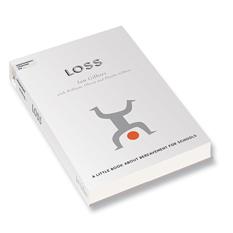Loss
At some point schools will reopen after Covid-19. At some point schools will come face to face with children who lost loved ones. Now what? Ian Gilbert shares some advice from personal experience to help schools help young people now and into the future.
I once wrote that death, for the British at least, was like Belgium. Everyone knows it’s close but no-one wants to go there.
Except now, death seems to be more like air. Everywhere. And if there isn’t death, there is the threat of it.
What a time to be a child.
When my three children lost their mother, tragically, twelve years ago, death was everywhere for us and in many ways it still is. A death in the family is an event. Grieving is a process. Loss, however, stays with you. It defines you as an adult and anchors you to that time in your childhood, when you want to go back to the point just before the event so that you can not only try and stop it happening but, and this is the heart-breaking bit, be with that person just one more lingering time.
Your life grows around that feeling, not past it.
Normality Wants You Back
As a child, school doesn’t stay away for long and normality wants you back. Normality is what other people will be living. It is what other people will be expecting, eventually, soon. But there is no normal. Not even the ‘new normal’ we are hearing so much about now. Normal died when your mother died. Or your father. Or your sibling. Normal is when tragedy happens to other people and normal is the death of a grandparent or a rabbit or some auntie you met once. Normal is everything in its time. A time to reap. To sow. To live and die.
No, you are now not normal. And school is knocking.
So, what helps?
Talk
Talk to the bereaved child about how they feel. Talk about how the other family members are. Talk about the person they have lost, who is also the most present person in their life right now. Talk about what they remember of that person. Talk them into not having died, for a while at least. Talk with the child about what they miss. Talk that child into being OK with their abnormality. Talk them towards tears, not away from them. Talk about their loss, not yours. Not now.
Don’t talk
Sometimes no words are enough. Just be with them. Listen to that piece of music. Drink that cup of tea. Look at that photo. Hold their hand. Bereavement makes you the loneliest person on the planet. Being with them in their solitude helps.
Act
'I didn’t know what to do so I did nothing’. Cowardice, not forgotten.
Anticipate. Anniversaries burn. Be ready for them. Birthdays, Christmases, Mother’s Days, Father’s Days. The days before the event’s anniversary, coming around once again, a dreadful, dreaded annual countdown and a collapse into relief when it’s gone, for another year.
Prioritise
Homework is important. Sort of. School work is important. Sort of. Staying alive, staying out of prison, staying off the streets, staying away from drugs and alcohol, staying together as a family. All of them a statistical presence now. They are important.
Accommodate
Good days and bad days. Good hours and bad hours. Children grieve in puddles, not rivers, they say. Be flexible. Be alert. A grieving child is not looking for an excuse to not participate, to not be there. There’s just this hole to get out of first, then I’ll be back, if you wait for me.
Remember
It hasn’t gone away. ‘You’re not crying, so you’re mum can’t be dead’, the child says. It doesn’t work that way. I’m between tears and always will be. Come back later.
Forget
Can we just get on and pretend I’m normal today. Tomorrow might be different but today, I’m me.
The thing is, I was wrong before (and not just because Belgium is a nice place to visit).
Death was all around. And as long as there is life, it always will be.
And it will enter your classroom, pandemic or no pandemic.
And it will come back again after that too.
And the difference between that death stealing two lives, the one who has gone and the child who remains, lies with you and the many small acts you take as the caring teacher of a child of loss. [ITL]
Independent Thinking On Loss is written by Ian with his three children and is published by the Independent Thinking Press. Royalties go to leading children's bereavement charity Winston's Wish.

To find out more about booking Ian Gilbert for your school, college or organisation call us on 01267 211432 or drop us an email on learn@independentthinking.co.uk.
Enjoy a free no-obligation chat.
Make a booking. Haggle a bit.
Call us on +44 (0)1267 211432 or drop us a line at learn@independentthinking.co.uk.


About the author
Ian Gilbert
Ian Gilbert is an award-winning writer, editor, speaker, innovator and the founder of Independent Thinking. Currently based in Finland, he has lived and worked in the UK, mainland Europe, the Middle East, South America and Asia and is privileged to have such a global view of education and education systems.